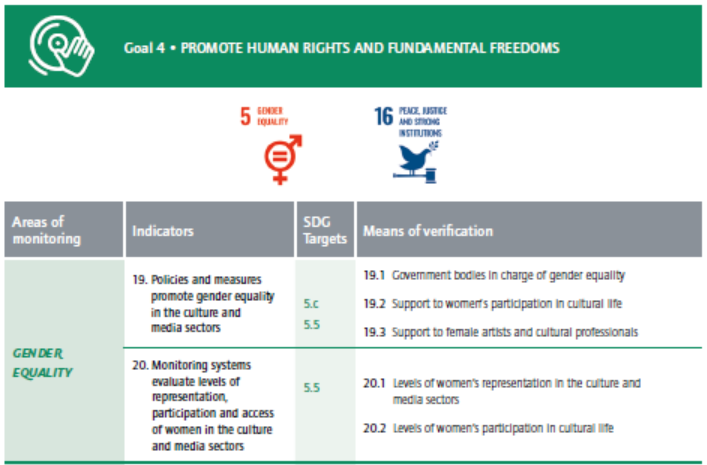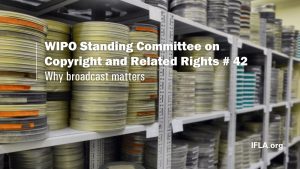Without intercultural dialogue, peace and sustainable development are not possible. The UN World Day for Cultural Diversity for Dialogue and Development (21 May) calls for recognition of the essential role that cultural diversity plays in enabling dialogue, building mutual understanding, and supporting better outcomes for all people.
IFLA has long championed the cross-cutting role of culture in building a better, more peaceful, world. As a member of the #Culture2030Goal Campaign, we have called for the recognition of culture as the fourth pillar of sustainable development. We have further called for a dedicated goal for culture in the post-2030 development framework, see the Statement by the #Culture2030Goal campaign on UNESCO MONDIACULT 2022 for more.
The UNESCO Convention on the Protection and Promotion of the Diversity of Cultural Expressions (2005 Convention) helps policymakers strengthen their commitment to supporting cultural diversity by providing a framework by which these values are transformed into actions.
By monitoring the implementation of this Convention, we can both measure the impact of culture on development in concrete terms and find a wealth of good practice examples that can inspire further initiatives.
For a practical approach to Cultural Diversity Day, this article will introduce the monitoring framework of the 2005 Convention – especially its relationship to the Sustainable Development Goals (SDGs). It will highlight how libraries can get involved in reporting. Finally, it will introduce the methodology of an ongoing research project in which IFLA is mapping the role of libraries in the reports of the 2005 Convention, which will provide a clear picture of how libraries help achieve its goals.
Protecting and Promoting Diverse Cultural Expressions
Parties to the 2005 Convention have expressed a commitment to culture, in recognition of its importance for creating a rich, varied world and driving sustainable development.
The Convention provides a framework by which governments can strengthen international cooperation and work towards policy provisions that will protect and promote cultural diversity, as well support the creators, knowledge-holders, and institutions that make and share culture.
The Convention notably established the International Fund for Cultural Diversity (IFCD), which provides grants in support of a dynamic cultural sector in developing countries.
Note: the 2022 Call for Applications to the IFCD is currently open! Find out more here: 2022 IFCD Call for Nominations.
Another important aspect of the 2005 Convention is its article 11, which encourages active participation with civil society (including libraries and library associations). This provides a strong base on which to build future cooperation with national authorities who implement the convention and measure its impact.
Find out more: Get Into the 2005 Convention
Measuring Progress
In order to better monitor implementation of the Convention, inform evidence-based policymaking, and align with the UN Agenda 2030, UNESCO introduced a Monitoring Framework in 2015.
This framework is based around four goals, which are drawn from the Convention’s guiding principles:
- Support sustainable systems of governance for culture
- Achieve a balanced flow of cultural goods and services and increase the mobility of artists and cultural professionals
- Integrate culture in sustainable development frameworks
- Promote human rights and fundamental freedoms
Within each goal, the Framework determines several areas of monitoring, which are critical themes that support the goal. Each area of monitoring is assigned indicators which can be used to measure success, which are in turn confirmed through corresponding means of verification.

Example from the UNESCO 2005 Convention Monitoring Framework
Note that each goal is specifically linked to corresponding SDGs. Further, each indicator is linked to one or more SDG targets, which directly connect it to specific tasks or outcomes within the SDG framework.
From the above example, policies and measures which promote gender equality in the culture and media sector indicate progress towards the Gender Equality monitoring area. This supports Goal 4 (Promote Human Rights and Fundamental Freedoms), which aligns with SDG #4 (Gender Equality).
However, even more specifically, this indicator is linked to SDG targets 5.c, which concerns adapting policies and enforceable legislation to support women and girls, and 5.5, which concerns equal participation and opportunities for leadership.
Why is this framework important?
Evidence-based policymaking is key to successful implementation of the Convention. This framework helps policymakers and other stakeholders better understand how supporting cultural diversity can impact on sustainable development.
For IFLA’s members – looking at the Monitoring Framework is a practical way to envision how the work your library is already doing – or could be doing in the future – aligns with these goals.
To start, could you think of library initiatives that satisfy these indicators?
- Policies and measures support diversity of the media (Goal 1)
- Policies and measures facilitate access to diverse cultural expressions in the digital environment (Goal 1)
- Operational programmes support the mobility of artists and cultural professionals, notably from developing countries (Goal 2)
- Policies and measures support equity in the distribution of cultural resources and inclusive access to such resources (Goal 3)
- Policies and measures promote and protect freedoms of creation and expression and participation in cultural life (Goal 4)
Explore further: Monitoring Framework – UNESCO 2005 Convention (from the 2005 Convention Global Report 2022)
Making your Impact Known
Countries that are party to the 2005 Convention are required to submit a report on their progress once every four years. These are called Quadrennial Periodic Reports, or QPRs.
In 2019, UNESCO reformed the reports to align directly with the Monitoring Framework. This data collections allows UNESCO to take a holistic look at how the world is protecting and promoting diverse cultural expressions, and how this relates directly to sustainable development.
UNESCO’s most recent overview of the state of cultural policy was debuted earlier this year: Re|Shaping Policies for Creativity: 2005 Convention Global Report 2022
Why are QPRs relevant for libraries?
QPRs present an opportunity for libraries and library associations to make their impact directly known to national cultural authorities and beyond.
Since 2019, UNESCO invites civil society stakeholders to participate in reporting with a dedicated Civil Society Organisation form. This form follows the reporting framework and allows civil society to share information on their initiatives for inclusion in the final national report.
UNESCO reports that 77% of QPRs submitted since 2019 included measures or initiatives undertaken by civil society organisations, so the willingness to include such input is clearly being demonstrated.
To make your impact known, follow these steps:
- Find out when your country’s next QPR is due: Periodic Reports
- Download the Civil Society Organisation form [download the word document here].
- Review the Monitoring Framework and determine relevant measures and initiatives your organisation/institution/ association has implemented in the last four years
- Get in touch with your National Point of Contact [list and contact details here], who is responsible for coordinating reporting in your country. Let them know you are completing the Civil Society Organisation form.
- Share the completed civil society organisation form with your National Point of Contact roughly six months before the deadline for submission
Coming Up
In September 2022, the UNESCO World Conference on Cultural Policies and Sustainable Development – MONDIACULT 2022 – will bring cultural policymakers and stakeholders from across the world together in Mexico City.
This conference will accelerate the global dialolgue on culture’s role in sustainable development and define immediate and future priorities.
Watch IFLA discuss ways in which libraries fit into these discussions here: ResiliArtxMondiacult 2022
To prepare for these discussions, IFLA is using insights collected through the 2005 Convention monitoring and reporting scheme to map ways in which libraries are being recognised as contributing to the goals of the Convention – and corresponding sustainable development goals.
There are myriad examples included in this body of information. For example, the 2005 Convention Global Report 2022 already provides some insight:
Goal 1: Supporting sustainable systems of governance for culture
- “Several countries, including Egypt, Norway, Qatar and Slovakia, have begun extensive work to digitize their national libraries, thereby facilitating access to, and the discoverability of, local cultural content in several languages” (UNESCO, 2022, pg. 107)
- “National Library for the Disabled [Republic of Korea] increased its membership by 84% in 2021 alone, as it expanded its provision in Braille, voice over and sign language” (UNESCO, 2022, pg. 105)
Goal 2: Achieve a balanced flow of cultural goods and services and increase mobility
- “China and Niger signed a cultural cooperation agreement to exchange information and expertise in the areas of audiovisual, publishing, libraries and exhibitions” (UNESCO, 2022, pg. 178)
Goal 3: Integrate culture in sustainable development
- “Developing and developed countries all implement a variety of measures for ensuring access to culture outside of the main urban areas… [for example] mobile libraries and bookstores deployed to stimulate reading (China, Egypt, Iraq).” (UNESCO, 2022, pg. 222)
- “Given that the COVID-19 pandemic has highlighted the challenge of digital exclusion, it is encouraging to see the reporting of measures aimed at ensuring greater connectivity in libraries across national territories (Argentina, Costa Rica).” (UNESCO, 2022, pg. 222)
IFLA will continue reviewing the body of reports submitted since 2019 to collect quantifiable data on the number of library-related measures and initiatives within each of the Convention’s four objectives. This study with further provide qualifiable data regarding innovative library initiatives that can serve as inspiration for the future.
Stay tuned for more in the lead up to Mondiacult 2022!
For questions or assistance: [email protected]

